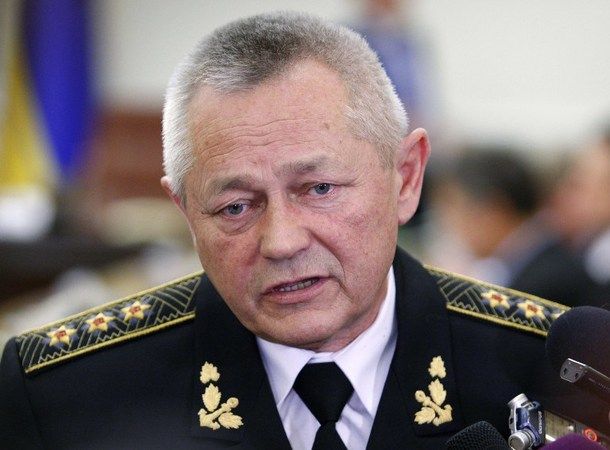 Ukraine's Defence Minister Igor Tenyukh speaks during the cabinet of the ministers sittings in Kiev on March 16, 2014. Photo: APFIn the wake of a March 16 referendum in which Crimeans voted to join the Russian Federation, Ukrainian leaders refused to cede any part of the peninsula, calling on their troops to prepare for war, kyivpost reports.
Ukraine's Defence Minister Igor Tenyukh speaks during the cabinet of the ministers sittings in Kiev on March 16, 2014. Photo: APFIn the wake of a March 16 referendum in which Crimeans voted to join the Russian Federation, Ukrainian leaders refused to cede any part of the peninsula, calling on their troops to prepare for war, kyivpost reports.
“Crimea was, is, and will be our territory,” said Defense Minister Ihor Tenyukh in a statement delivered at the Ukrainian Crisis Media Center on March 17.
Former heavyweight boxing champion and leader of the Ukrainian Democratic Alliance for Reform Vitali Klitschko announced that Ukrainian troops would remain at their bases, even after March 21, the end of a peace treaty signed by the interior ministries of Ukraine and Russia.
In accordance with the March 16 peace treaty, the Russian Interior Ministry promised to allow Ukrainian soldiers to pass freely into and out of their bases, which Russian troops had surrounded for more than two weeks. Tenyukh said that the Russian military had thus far respected the terms of the treaty.
Although tensions have de-escalated around military bases in Crimea since the signing of the treaty, neither side is prepared to back down. The Russian government expects that Ukrainian troops will surrender their military bases before the conclusion of the treaty. The Ukrainian government has said that it will not withdraw forces from Crimea, using the peace as an opportunity to replenish supplies for Ukrainian troops stationed on Crimean bases.
When asked whether Ukrainian troops would fight to defend Crimea, Tenyukh replied tersely, “The armed forces will execute their tasks, ” later adding, “Ukrainian forces will stay [in Crimea] until all their tasks have been completed.”
Speaking to the Verkhovna Rada in the evening on March 17, Ukrainian President Oleksandr Turchynov said that his government would "do everything possible to prevent war." However, he noted that "the threat of war is real...We are strengthening our defense capacity. Ukraine is ready to defend its territory."
Earlier on March 17, the Ukrainian parliament voted to allot 6.7 billion hryvnia (more than $600 million) to bolster the country’s defenses over the next three months, and to partially mobilize the armed forces.
Tenyukh said that the mobilization was intended to bring the military to “full readiness.” The Verkhovna Rada called for 40,000 troops to be mobilized, calling on reservists to prepare for active duty.
As the Ukrainian economy teeters on the verge of default, the country’s top leaders have been forced to devote resources to bolstering Ukraine’s military, which many believe former President Victor Yanukovich intentionally undermined over the course of his three and a half year reign.
Klitschko said Ukrainian parliamentarians were prepared to send 25 percent of their salaries to “support patriots in Crimea.”
Pavlo Petrenko, Ukraine’s Justice Minister, said that the “the most important issue is to restore the military might of Ukraine.”
“Our army should be ready for combat,” said Petrenko.
Klitschko reiterated that the March 16 referendum in Crimea was conducted illegally, and that the peninsula remains “part and parcel” of Ukraine. As such, the Ukrainian government will continue to provide services to Crimea, including electricity, gas, and water.
In another indication of deteriorating relations between Ukraine and Russia, Klitschko announced that Volodymyr Yelchenko, the Ukrainian ambassador to Russia, would be recalled from Moscow for consultations with the newly formed government in Kyiv.
The escalation in rhetoric comes as pro-Kremlin Crimean leaders took the first steps towards integration into the Russian Federation.
The Crimean Supreme Council voted on March 17 to introduce Moscow time to Crimea on March 30. On the same day, Crimean leaders announced that the Russian ruble would begin circulating alongside the Ukrainian hryvnia and would become the only currency in Crimea by Jan. 1.
 В Атырау -10
В Атырау -10